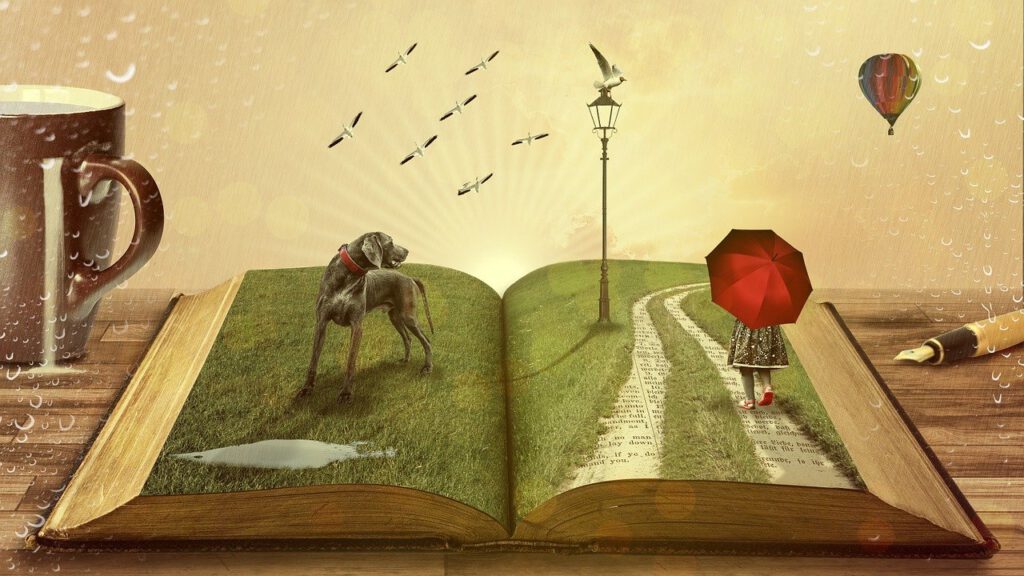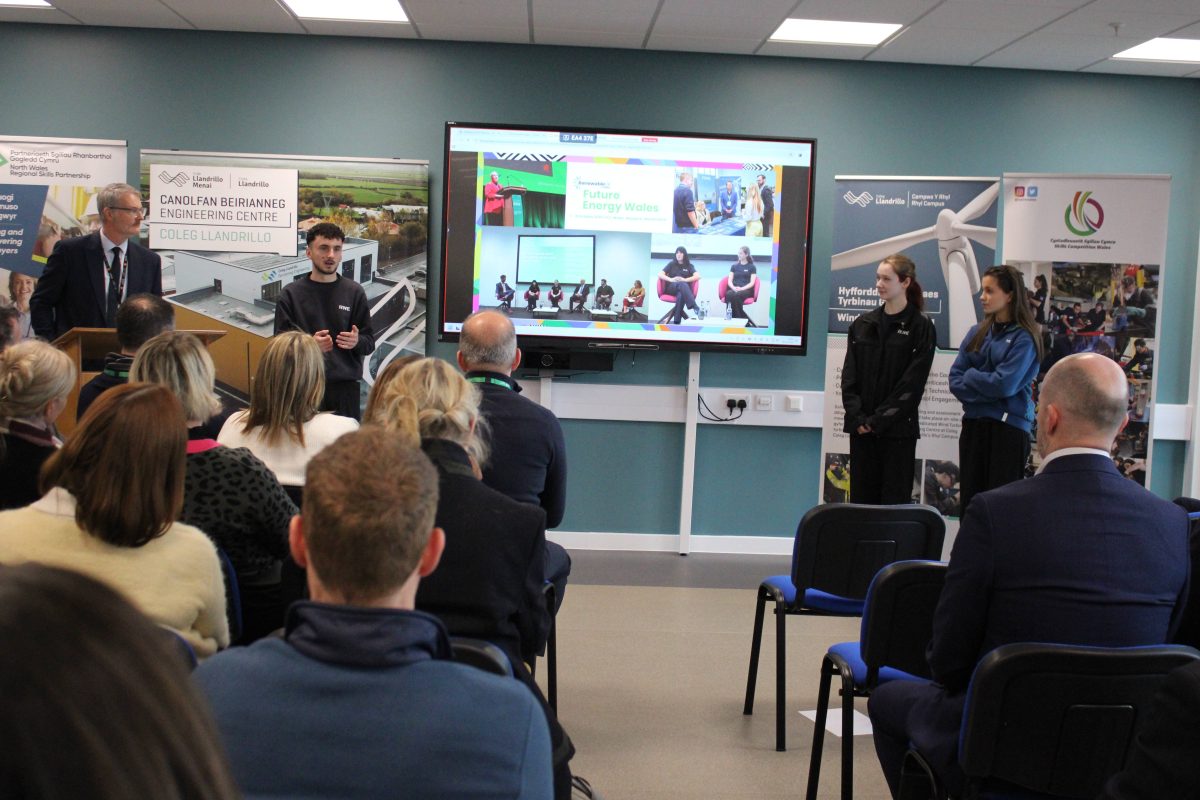Inspiring young people through the ‘gift of words’ this festive season

From Alice in Wonderland to Winnie the Pooh: authors, TV personalities, and public figures give the gift of words to inspire and support young people after a difficult 2020
Authors, illustrators, TV personalities, and public figures have come together to share the books, phrases, and quotes that they would give as a gift to young people—or anyone who might need it—during this year’s festive season.
Oxford University’s Press (OUP), the world’s largest university press, has launched the campaign to highlight the important role words can play in inspiring young people and creating opportunities through education and language—particularly in a year that has been so difficult, disruptive, and uncertain for people all over the world.
OUP’s recent Oxford Language Report: Bridging the Word Gap in Transition identified a growing shortfall in young people’s vocabulary, especially at the point of transition from primary to secondary school. 92 per cent of teachers surveyed believed that the ‘word gap’ – where a child’s vocabulary is below expectations for their age – had widened because of COVID-related school closures. Additionally, Oxford Language’s recent Words of an Unprecedented Year report highlighted how people have used language to help them navigate and define the uncertainty of 2020.
Among the contributors to the campaign were restaurant critic and columnist Giles Coren, who said he would give young people ‘any Snoopy book, because all human life is there…it will seed a hunger for literature that will last their whole life.’ Author and TV wordsmith Susie Dent recommended Le Grand Meaulnes (The Lost Estate) by Alain-Fournier, which is all about ‘first love and a magical lost house, set in the twilight world between childhood adolescence.’ Fellow author and broadcaster Gyles Brandreth suggested Alice’s Adventures in Wonderland and Alice Through the Looking-Glass, because young people will ‘meet some of the most amazing (and amusing) characters ever created and will discover what fun words can be’.
Other contributions from the world of literature included:
- Actress, singer, playwright, and author Cerrie Burnell, who shared a quote from Emily Dickinson: ‘Hope is the thing with feathers, that perches in the soul’
- Carnegie prize-winning author, Anthony McGowan, who suggested the ‘entrancing’ poem, Fire and Ice
- Roopa Farooki, junior doctor, award-winning adult novelist and children’s author of The Cure for a Crime, who recommended an exchange between Winnie the Pooh and Piglet from Us Two
- Former Waterstones Children’s Laureate and illustrator of Pippi Longstocking and Charlie and Lola Lauren Child, who provided a quote from poet Mary Oliver: ‘Tell me, what is it you plan to do with your one wild and precious life?’
- Harriet Muncaster, author and illustrator of the best-selling Isadora Moon series shared her love of the Brambly Hedge series, as well as The Borrowers.
Several MPs and peers also shared words, books, and phrases that they hope could provide inspiration for young people:
- Robert Halfon MP, Chair of the Commons Education Select Committee suggested either The Hobbit by JRR Tolkein or The Lion, the Witch, and the Wardrobe by CS Lewis because they were ‘tales of heroism, leadership, fighting against the odds, evil villains, and of course, featuring three breakfasts and Turkish delight’.
- Dr Lisa Cameron MP, Chair of the APPG for Disability and member of the APPG for Health, would give this quote from The Diary of Anne Frank: ‘How wonderful it is that nobody need wait a single moment before starting to improve the world.’
- Rt Hon the Lord Paul Boateng of Akyem and Wembley, who is also the Chair of Book Aid International, said he would give Ananse the Spider and Braer Rabbit because ‘brave, kind hearted, mischievous and fun, they overcome all not by force but by words driven home by deeds.’
- Elliot Colburn MP, who sits on the Women and Equalities Committee, recommended the Harry Potter series because ‘Harry’s story of overcoming adversity, the importance of friendship, and seeing the bigger picture in life still resonates with [him] today’.
Speaking about the initiative, Nigel Portwood, CEO of Oxford University Press said:
“We know that words and language can be a powerful force for good. They inspire creativity, feed the imagination, broaden our perspectives, open the door to opportunities in education, and in later life—and play a valuable role in helping people to make sense of the world around them. 2020 has been a confusing, uncomfortable year. Our research has emphasized the impact of the pandemic on young people’s education, and indeed on all of us. It’s more important than ever that we encourage everyone—particularly children who have their whole futures ahead of them—to access, use, and appreciate words and language. That’s why we believe that the best gift we can give right now, is the gift of words.”
Full list of submissions
Olivia Blake MP
I’d share The Bear in the Stars, a short picture book written by my cousin, as it tells the story of the climate crisis and how everyone, young and old, can still make a difference in a powerful way.
Lord Boateng of Ayken and Wembley, Chair Book Aid International
There is no better gift to a child than Ananse the Spider and Braer Rabbitt who populated my early reading in two continents. Brave, kind hearted, mischievous and fun they overcame all not by force but by words driven home by deeds.
I would also give Things Fall Apart. The lesson is the same whether Yeats or Achebe tell it. Words and truth must count for something or the ground crumbles beneath us.
Gyles Brandreth, author, broadcaster, and editor of The Oxford Book of Theatrical Quotations and The Oxford Book of Humorous Quotations
My gift of words to young people always comes in the form of the two books that gave me my lifelong love of language: Alice’s Adventures in Wonderland and Alice Through the Looking-Glass.
Lewis Carroll had an amazing way with words. He loved playing with language. I encourage kids to read the Alice books because in them they’ll meet some of the most amazing (and amusing) characters every created and will discover what fun words can be. Lewis Carroll invented lots and lots of new words and gave them the meanings he wanted to give them. We’ve been doing the same in 2020, telling teenagers they’re in their quaranteens and new-borns they are not millennials, they’re coronials.
Alex Brychta MBE, Series Creator and Author of Oxford Reading Tree Biff, Chip, and Kipper stories
When I was about eight or nine, I loved The Children of Noisy Village by Astrid Lindgren which is about the adventures of kids living on three neighbouring farms in Sweden. I read it over and over in Czech, since that’s where I grew up, but I now have an English translation too.
When I came to the UK at the age of 12 not knowing a word of English, I was given the entire set of Tintin. The graphic novel format helped me greatly in learning the language.
Cerrie Burnell, actress, singer, playwright, and author
Mary Oliver: ‘Tell me, what is it you plan to do, with your one wild and precious life?’
Or
Emily Dickinson: ‘Hope is the thing with feathers, that perches in the soul.’
Dr Lisa Cameron MP, Chair for the All-Party Parliamentary Group (APPG) for Disability and member of the APPG for Health
I would give The Diary of Anne Frank. The quote that stays with me from this vital memoir from such an amazingly compassionate young person is ‘how wonderful it is that nobody need wait a single moment before starting to improve the world.’
Lauren Child, former Waterstones Children’s Laureate and illustrator
When life feels too much to bear, I think of these words and they help me focus on what is good and what can still be.
Mary Oliver: ‘Tell me, what is it you plan to do, with your one wild and precious life?’
Elliot Colburn MP, member of the Women and Equalities Committee
I would give a young person the Harry Potter books to read, because it was those books that opened me up to the joy of reading and escaping into new worlds. Harry’s story of overcoming adversity, the importance of friendship and seeing the bigger picture in life still resonates with me today.
Giles Coren, restaurant critic and columnist, for The Times and Times Radio
I would give them a Snoopy book, any Snoopy book, because all human life is there, as it should be in any piece of writing that aspires to the status of art. And if they get into Snoopy, it will seed a hunger for literature that will last their whole life. And if they don’t, well, that would be very weird.
Sir Barry Cunliffe, archaeologist, academic, and author
My choice is something I discovered early in life and return to from time to time. It’s a short thank-you note by the Tang Dynasty poet, Li Po called Coming down from Chung-Nan Mountain – a reminder that in all the turmoil of life peace can be found in undemanding friendship.
Susie Dent, author and TV wordsmith
My gift of words would be the story of Le Grand Meaulnes by Alain-Fournier (The Lost Estate in English). I first read this haunting, dreamy tale when I was seventeen, and it has stayed with me ever since. It’s about first love and a magical lost house, set in the twilight world between childhood and adolescence. Every time I pick it up, I fall under its spell again.
Roopa Farooki, junior doctor, award-winning adult novelist, and children’s author
The gift I’d give to you are the beautiful poems by AA Milne, the creator of Winnie-The-Pooh, in Now We Are Six and When We Were Very Young.
My favourite line from is from US TWO, when Pooh and Christopher Robin are looking for dragons; it’s about being curious, adventurous and brave, and never afraid, with your best friend beside you!
‘I wasn’t afraid,’ said Pooh, said he, ‘I’m never afraid with you.’
Sian Griffiths, Education Editor, The Sunday Times
From Sylvia Plath’s poem Child:
‘Your clear eye is the one absolutely beautiful thing.
‘I want to fill it with color and ducks,
‘The zoo of the new’
Or Morning Song (also Plath)
‘Love set you going like a fat gold watch.
‘The midwife slapped your footsoles, and your bald cry
‘Took its place among the elements.’
Robert Halfon MP, Chair of the Commons Education Select Committee
The Hobbit by JRR Tolkein or The Lion, the Witch and the Wardrobe by CS Lewis. Two of the greatest books for younger generation ever written. Tales of heroism, leadership, fighting against the odds, evil villains and of course, featuring three breakfasts (in the case of The Hobbit), and Turkish delight (in The Lion, the Witch and the Wardrobe)!
Baroness Harris of Richmond, member of the APPG on Mindfulness
When I speak to schools I always end with, ‘Take every opportunity that is offered to you – be thoughtful- be kind’.
For a young person – a book I have recently read – that was written by a colleague of mine about his young life – and was inspirational. It is I Never Promised you a Rose Garden by Jonny Oates.
For an adult it would be Becoming by Michelle Obama.
Roderick Hunt MBE, Series Creator and Author of Oxford Reading Tree Biff, Chip, and Kipper stories
Among may favourite stories are the Winnie-the-Pooh books (AA Milne), and this is my favourite (and most helpful) quote. This is what Piglet says to Pooh as they set off to see Christopher Robin.
‘Supposing a tree fell down, Pooh, when we were underneath it?’
‘Supposing it didn’t,’ said Pooh after careful thought.
Piglet was comforted by this.
Lord Knight of Weymouth, member of the APPG for Education
Oh, the Places You’ll Go! by Dr Seuss. It is a beautiful story of every individual’s capacity to make change happen, to deal with the struggles and bounce back – ‘kid, you’ll move mountains!… so… get on your way!’
Ruth Lister, Baroness Lister of Burtersett, APPG on Mindfulness
My gift of words is ‘when the world is puddle wonderful’ from In Just by E.E. cummings. I read the poem in my youth and the phrase still makes my heart sing.
Doreen Massey, Baroness Massey of Darwen, Young People’s Health APPG
I think the Velveteen Rabbit. It had such an impact on me and I still quote its wisdom in speeches – the how you become real section – when your fur gets scuffed and your eyes fall out but you are still real to someone. I once quoted this in a speech in Parliament. A hardened politician asked me about it and I gave her a copy. She said ‘I cried.’ Ah, the power of words!
Anthony McGowan, author
Fire and Ice is the poem I’d like to pass on to a young person. I’d guess that, like me, they’ll be a little perplexed at first – although the language is quite plain. But I’d hope it would plant itself in their mind, and stay there, ticking…
‘Some say the world will end in fire,
Some say in ice.
From what I’ve tasted of desire
I hold with those who favor fire.
But if it had to perish twice,
I think I know enough of hate
To say that for destruction ice
Is also great
And would suffice.’
Wendy Meddour, author and illustrator
I start my day with a cup of tea in a china mug that says: ‘She is too fond of books and it has turned her brain.’ (Louisa May Alcott, Little Women).
It makes me smile and reminds me that you should always pursue your dreams, even if others think you’re mad. (And yes. My dream was to read and write books).
Harriet Muncaster, author and illustrator
Books are magical doors into other worlds. You can escape into them and live a different life for a few hours!
A series of books I really love escaping into are the Brambly Hedge books by Jill Barklem. She creates such a wonderful, magical, comforting world where the mice live inside hollow trees and go about their days surrounded by beautiful nature. I find them absolutely charming and they bring me lots of joy to read.
My passion is tiny things and so I especially love reading about tiny worlds like in Brambly Hedge. Another series of books that really resonates with me for similar reasons is the Borrowers series by Mary Norton about a tiny little girl called Arrietty. I find that if I read books that contain something I’m really passionate about (like miniatures!) then I get an extra amount of delight from them!”
Korky Paul, illustrator for Winnie and Wilbur
Ever since I was a child, I have loved drawing and so was always captivated by both the words and especially the pictures. One book that I especially adored, and still do, is Struwwelpeter by Dr Heinrich Hoffmann.
It comprises ten cautionary tales, written in rhyme about misbehaving children, the punishments meted out to them and the consequences they endure. The most memorable tale for me was ‘The Story of the Inky Boys’.
Growing up in colonial Rhodesia, now Zimbabwe, it really resonated with me. It concerns The Great Agrippa who plunged mean and nasty children into a pot of black ink for teasing a ‘black-a-moor’ as punishment for their misbehaviour. Great Agrippa was a magnificent figure dressed in a long red gown, red pointy hat and a full red beard. A memorable image indeed.
As I child whenever I heard anyone making racist remarks, I wished I could magic The Great Agrippa to appear and give them their come-uppance.
Victoria Prentis MP, member of the APPG on Child and Youth Crime
The Tiger Who Came to Tea with the quote ‘Or did he? We will never know. Sophie probably doesn’t know herself.’
David Ramsbotham, Lord Ramsbotham, member of the APPG for Young People’s Health
I would give them my favourite childhood book Perkin the Pedlar, which is an alphabetical journey round England, with Perkin telling the story of various villages, illustrated with beautiful woodcuts by Eleanor Farjeon. I have it on my shelves still, and read it to my two sons.
Kathryn Sutherland, author and academic
Jane Austen describes the short pains and the long joys of reading in Northanger Abbey: ‘it is very well worthwhile to be tormented for two or three years of one’s life, for the sake of being able to read all the rest of it.’
Dame Marina Warner, President of the Royal Society of Literature and author of fiction, criticism, and history author
Ted Hughes and Seamus Heaney, The Rattle Bag; RL Stevenson, A Child’s Garden of Verses; Christina Rossetti, Sing Song: A Nursery Rhyme Book; and Eleanor Farjeon, ‘Elsie Piddock Skips in her Sleep’, which was part of the book of stories Martin Pippin in the Daisy Field, but I found it published separately with wonderful pictures by Charlotte Voake.
I think these favourites have something in common that arises from the spring and leap of the verse, or, in the case of Eleanor Farjeon’s enchanting fable, the joyous repetitions in the prose. Heaney and Hughes specially loved the music of word patterns and they found, a huge and wonderful variety of poems, old and new, which move to a patter and beat, striking notes of mystery and wonder. The stories and poems are filled with a blithe light-footedness that is a life force in itself, opening up the possibility of happiness. Meaning often eludes but that doesn’t matter and may even enhance the experience. The rhythms then have a way of lingering in the memory which continues to bring back the hope of those early encounters with them.











Responses